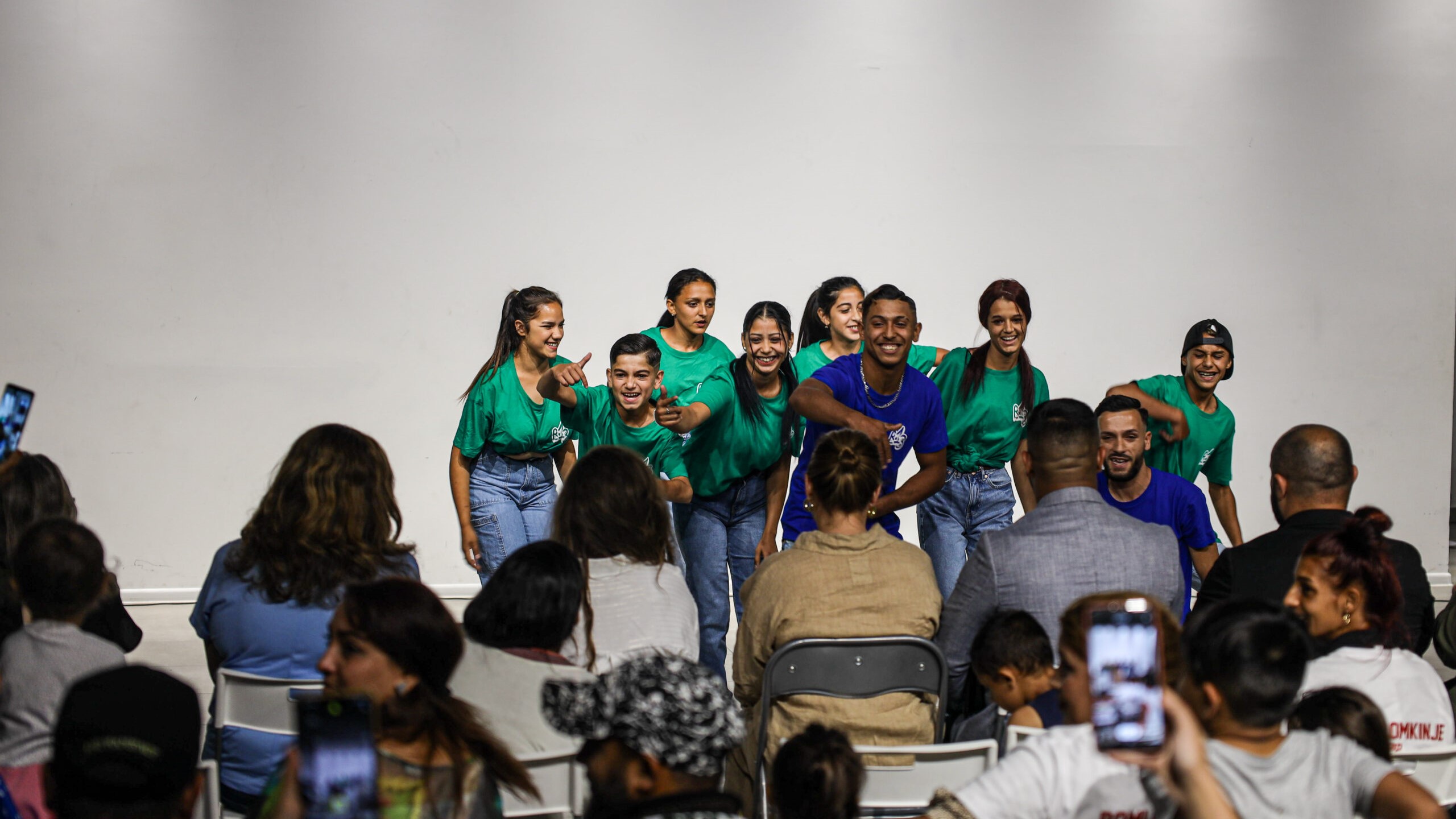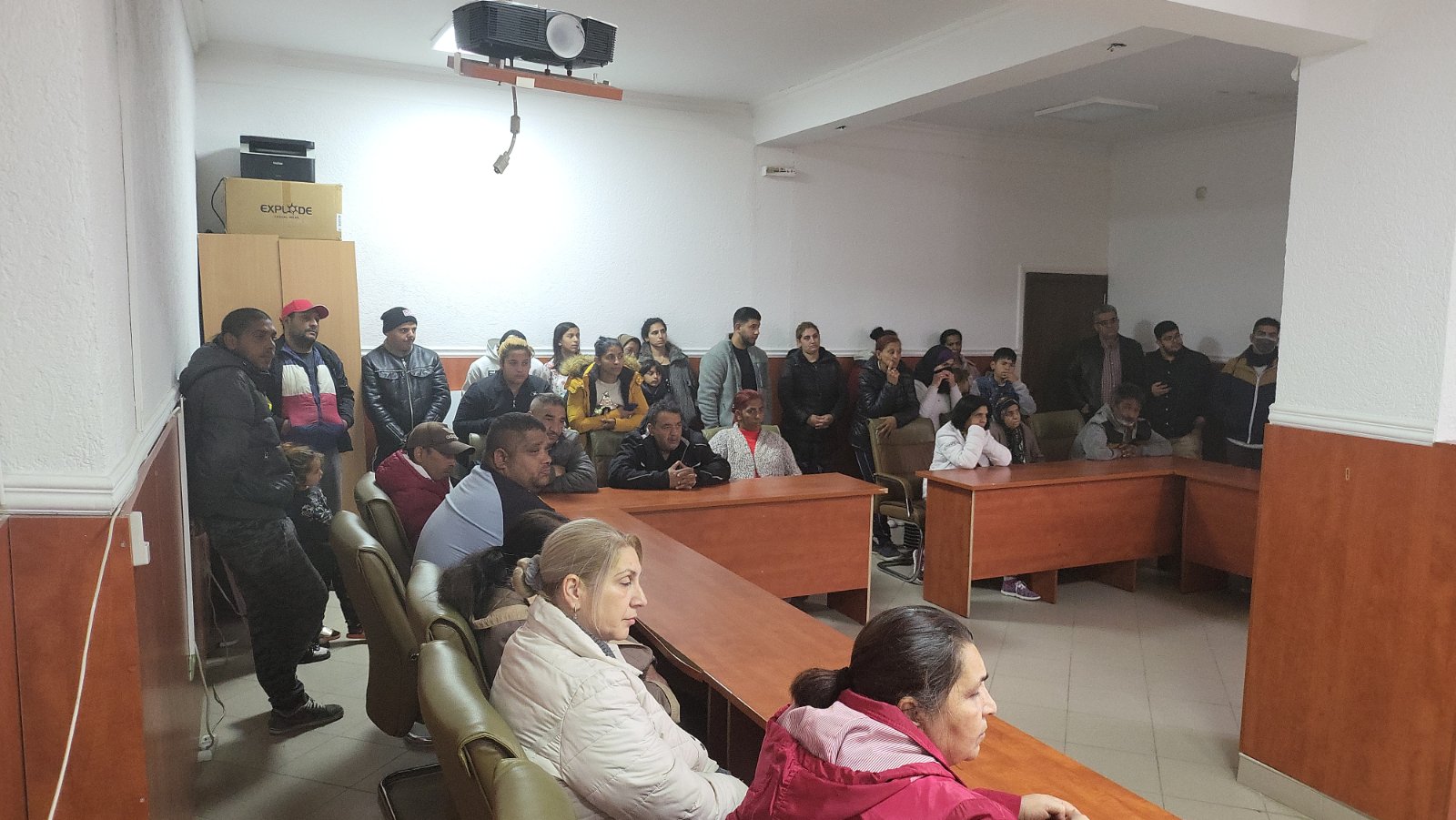
In cultural centres across Serbia, young Roma women and men are creating a thought-provoking art performance, asking: “What should a Roma look like?” Their narrative challenges stereotypes and breaks down barriers to Roma inclusion.
In Berat, Albania, young Roma are venturing into their local neighbourhoods to capture the stories of Roma returnees. Their goal is to share these stories with a wider audience and help overcome obstacles that make reintegration difficult.
Meanwhile, in Shuto Orizari, North Macedonia, Roma and returnees are coming together in community forums to voice their needs for better government services. This collaboration is resulting in the creation of a space where services will be more accessible to vulnerable groups and where dialogue between the government, civil society, and communities can take place.
These are just three examples of around 40 community-driven initiatives supporting Roma returnees to reintegrate and escape poverty, as part of the EU-funded UNDP Regional Returnee Reintegration Project. The project spans nine municipalities in Albania, North Macedonia, and Serbia.
With support from the EU and UNDP, Roma, returnees, and local communities are learning, working, and having fun together. Their cooperation challenges prejudices, breaks down barriers to inclusion, and improves the economic well-being of Roma and returnees alike.
This collaboration is recognised on the International Day for the Eradication of Poverty, highlighting the collective power to drive change and improve economic well-being and social recognition.
Creative expression for Inclusion
In Novi Sad, Serbia, young Roma are using their creativity to challenge stigma. Their performances, which ask the audience “What should a Roma look like?” encourage people to confront their own prejudices.
Actress Aleksandra Milojković Novikova brings this message to life at the Serbian National Theatre with her monodrama “Alone.” The performance calls on the audience to reflect and reminds us all that we can make a difference.
Supported by the EU and UNDP, these performances aim to break down stereotypes and show that everyone has a role in creating inclusive societies.
Giving voice to communities
Roma and returnee communities are often misrepresented in the media. To change this, young Roma have come together to become “community reporters.”
With support from the EU and UNDP, they are learning journalism and storytelling skills to amplify the voices of Roma and returnees.
In Berat, Albania, these reporters have spent time with Roma returnees, documenting their struggles and successes as they rebuild their lives. One story features a group of women returnees who have started a social business offering care and cleaning services. With media coverage, their business is growing.
This approach to community-led reporting demonstrates how media can advocate for the inclusion of vulnerable groups. You can explore their work through video documentaries and podcasts to learn more about Roma returnees’ challenges and successes.
Making public spaces and services work for people
In Shuto Orizari, Skopje, a new community space is being built to foster connections between the government and vulnerable groups, improving access to public services. The Shuto Orizari Resource Centre, a one-stop shop for returnees and other vulnerable individuals, was shaped through consultations with local communities to address their needs.
With EU and UNDP support, this centre is not only providing services but also creating a space for dialogue and cooperation between the government and the community. Over time, it will evolve based on the needs and contributions of the people who use it.

Cooperation for inclusion and poverty reduction
Cooperation and community action are essential for inclusion and poverty reduction. By working together, both within the Roma community and with broader stakeholders, real change can happen. These efforts address immediate needs, like improving public services, while also tackling long-term challenges like prejudice.
When communities come together, they can achieve things individuals cannot. Through collective action, people can rise above poverty. On October 17, the International Day for the Eradication of Poverty, and every day, let’s recognise the power of working together to break down stigma and create a more inclusive world.
About the Project
The Reintegration of Returnees in the Western Balkans project focuses on breaking down the barriers that prevent vulnerable returnees from reintegrating into society. This project, part of the EU Instrument for Pre-accession Assistance (IPA) II, supports the rights of the Roma community and the reintegration of returnees, working with partners like UNDP, World Bank, and the Council of Europe.
In Albania, North Macedonia, and Serbia, the project is testing new approaches to sustainable reintegration at the local level. It also facilitates dialogue on improving policies and programmes across the Western Balkans to support vulnerable returnees.
With support from the EU and UNDP, they are learning journalism and storytelling skills to amplify the voices of Roma and returnees.
In Berat, Albania, these reporters have spent time with Roma returnees, documenting their struggles and successes as they rebuild their lives. One story features a group of women returnees who have started a social business offering care and cleaning services. With media coverage, their business is growing.
This approach to community-led reporting demonstrates how media can advocate for the inclusion of vulnerable groups. You can explore their work through video documentaries and podcasts to learn more about Roma returnees’ challenges and successes.
Making public spaces and services work for people
In Shuto Orizari, Skopje, a new community space is being built to foster connections between the government and vulnerable groups, improving access to public services. The Shuto Orizari Resource Centre, a one-stop shop for returnees and other vulnerable individuals, was shaped through consultations with local communities to address their needs.
With EU and UNDP support, this centre is not only providing services but also creating a space for dialogue and cooperation between the government and the community. Over time, it will evolve based on the needs and contributions of the people who use it.

Cooperation for inclusion and poverty reduction
Cooperation and community action are essential for inclusion and poverty reduction. By working together, both within the Roma community and with broader stakeholders, real change can happen. These efforts address immediate needs, like improving public services, while also tackling long-term challenges like prejudice.
When communities come together, they can achieve things individuals cannot. Through collective action, people can rise above poverty. On October 17, the International Day for the Eradication of Poverty, and every day, let’s recognise the power of working together to break down stigma and create a more inclusive world.
About the Project
The Reintegration of Returnees in the Western Balkans project focuses on breaking down the barriers that prevent vulnerable returnees from reintegrating into society. This project, part of the EU Instrument for Pre-accession Assistance (IPA) II, supports the rights of the Roma community and the reintegration of returnees, working with partners like UNDP, World Bank, and the Council of Europe.
In Albania, North Macedonia, and Serbia, the project is testing new approaches to sustainable reintegration at the local level. It also facilitates dialogue on improving policies and programmes across the Western Balkans to support vulnerable returnees.
Please wait while your video is being uploaded...
Don't close this window!